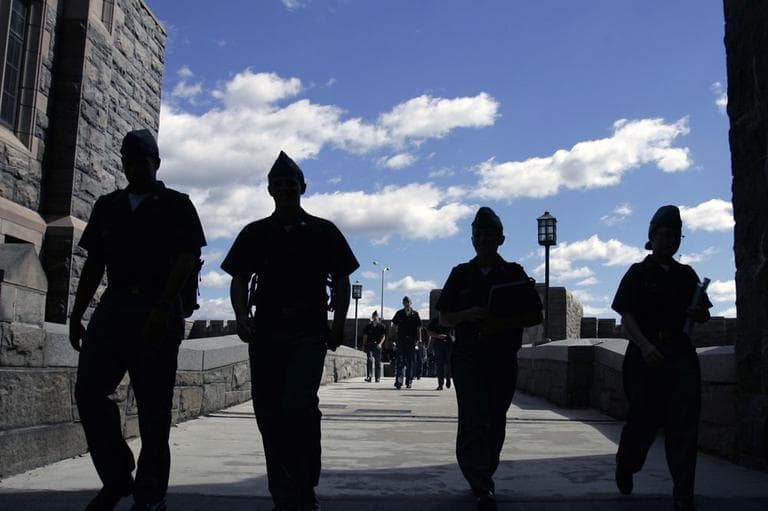Advertisement
Is The Military Losing Its Best?
ResumeA former Air Force officer says the U.S. military is bleeding talent and needs an overhaul. We’ll listen. Plus: the death of internet activist Aaron Swartz.

The US military is often seen as a model of leadership development. But it’s a bust, says my guest today, when it comes promoting and hanging on to its very best officers.
Tim Kane was one bright young officer who left, frustrated. There are a lot more, he says, who go because the path up is so slow. Stodgy. Blind to merit. He’s calling for a revolution in the way we fill the top ranks.
This hour, On Point: Bleeding talent in the US military. And we’ll look at the shocking suicide of the young crusader for Internet and information freedom, Aaron Swartz.
-Tom Ashbrook
Guests
Tim Kane, author of "Bleeding Talent: How the US Military Mismanages Great Leaders and Why It's Time for a Revolution."
Seth Moulton, served as an active-duty marine in Iraq. Now in the inactive reserves for the Marine Corps, currently working on a healthcare startup. (@sethmoulton)
PLUS: CLOSING SEGMENT — AARON SWARTZ

Computer prodigy Aaron Swartz, who helped develop RSS and co-founded Reddit, has been found dead weeks before he was to go on trial on federal charges that he stole millions of scholarly articles in an attempt to make them freely available to the public.
Guest
Lawrence Lessig, professor of law and leadership and director of the Center for Ethics at Harvard University. He was a friend of Aaron Swartz and at one point served as his lawyer. (@lessig)
From Tom's Reading List
The Atlantic Why does the American military produce the most innovative and entrepreneurial leaders in the country, then waste that talent in a risk-averse bureaucracy? Military leaders know they face a paradox. A widely circulated 2010 report from the Strategic Studies Institute of the Army War College said: 'Since the late 1980s … prospects for the Officer Corps’ future have been darkened by … plummeting company-grade officer retention rates. Significantly, this leakage includes a large share of high-performing officers.'"
Foreign Policy "In the late-90s, Tim Kane was an Air Force vet turned software entrepreneur, and he was surprised to find himself surrounded in the start-up business community of Southern California by fellow veterans who exchanged stories of their times in the service like secret handshakes. The more he thought about it, though, the more it made sense. The military, at its best, is a talent incubator designed to produce leaders — and a leader in the military has transferrable skills to be a leader in the private sector."
Forbes "The root of the problem, he says, is a 1980 law called the Defense Officer Personnel Management Act, or DOPMA, which lays out exactly how leaders in all the services should be promoted. The law includes a progression track with strict rules and timetables. Compensation has nothing to do with merit, assignments have little to do with officers’ abilities and evaluations fail to give useful feedback or skills assessments."
Excerpt from "Bleeding Talent"
This program aired on January 14, 2013.